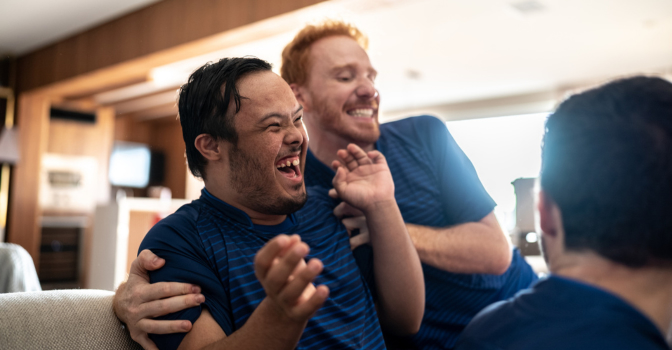Getting involved in the community and participating in activities are excellent ways to learn skills and build confidence.
A range of NDIS and mainstream supports are available to help people with disability connect with other people and overcome any barriers encountered along the way.
As part of our Leap in! Presents webinar series, we recently explored the different areas of NDIS funding and how they can work together to help you connect with your community.
Why is it important to focus on social and community connections?
Social and community participation is where people interact with others, including through programs, social gatherings, workshops, courses or other activities.
There are loads of potential benefits from connecting with others in the community:
- Experiencing new things
- Developing more confidence
- Meeting other like-minded people
- Feeling less lonely or isolated, leading to positive mental health outcomes
- Increasing opportunities for further participation, like employment or study.
NDIS-funded social and community supports.
The NDIS can fund the extra help you need because of disability to take part in these activities. Funding in your NDIS Plan can also help you overcome some of the barriers to community participation.
Types of things that the NDIS may fund include:
- Specialised equipment or modification to the equipment you need to participate
- Help to build your skills to take part in these activities
- A support worker to help you participate in activities, such as help changing into sports clothes or setting you up to join an activity
- Help to travel to a recreation event when you can’t use public transport and it’s not reasonable for family or friends to take you.
Below we break down the NDIS budgets and how they can fund various aspects of social and community supports.
Core – Assistance to access community, social and recreational activities.
- Assistance with social and community participation funding is typically used to pay for a support worker to assist with or supervise you to engage in community, social, recreational or economic activities including disability-specific camps, vacations or courses.
- These supports can be provided in various locations such as in the community or a centre.
- You’ll need to pay for the cost of activities yourself. The NDIS does not fund event tickets, or the cost of entry for a support worker.
Capacity Building – Improved daily living.
- Covers group therapy supports that can build independence and skills, such as speech therapy, occupational therapy or exercise physiology.
- You can also engage a support worker to link you to relevant groups, improve your knowledge about friendships or help you build confidence before joining a group session.
Capacity Building – Community participation activities.
- Can be used for costs of tuition fees, art classes, sports coaching and similar activities that build skills and independence. This includes camps, classes, and vacation activities that have capacity building components.
- It may also cover a limited number of lessons to try out an activity and test your capability and interest in an activity – such as horse riding, art, dance or singing classes.
Capacity Building – Community engagement assistance.
- Support to empower you to improve interactions with your social network.
Non-NDIS disability social supports.
Companion cards: Each state government issues a companion card that covers the cost of a carer to attend an event or travel with you.
Vouchers for children: State governments offer vouchers for children with health cards to use for mainstream sporting and community activities.
- New South Wales (NSW) – Active and Creative Kids voucher
- Northern Territory (NT) – Sport Voucher Scheme
- Queensland (QLD) – Fair Play Voucher
- South Australia (SA) – Sports Voucher
- Tasmania (TAS) – Ticket to Play voucher
- Victoria (VIC) – Get Active Kids voucher
- Western Australia (WA) – KidSport
Example: Going out for the day.
Jonas is attending a group activity offered by a local disability provider. He needs assistance to attend and get to the venue and uses his NDIS funding to pay a support worker to accompany him. After the activity, Jonas and the support worker catch a bus to a local café for lunch. Lunch is an everyday expense they pay for themselves.
Example: Isolated teenager.
Olivia wants to connect with others and make friends. She’s also keen to learn to be more independent in daily life and getting around. Olivia attends a disability-specific group activity to build connection and confidence (funded from her NDIS Core budget). She also tries a mainstream activity such as bowling (funded from her NDIS Capacity Building budget). A support worker attends and delivers support as needed (funded from her Core budget).
Social and recreational activities are part of everyday life, building connections and confidence. By combining different elements of your NDIS Plan and mainstream supports, you can access diverse opportunities, be part of your community and build new skills along the way!
Catch the next Leap in! Presents webinar on social and community supports.
Join Leap in! Learning and Development Manager, Dee, to learn what supports are available to help people on the NDIS engage with their community and become more social.
When: Thursday 21 March, 10am–11am AEST.
Cost: FREE
Where: From the comfort of your home or office, with Zoom.

